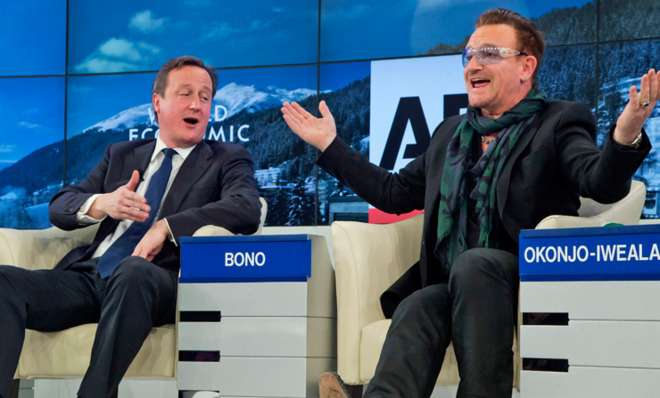Where is the Davos for the 99 percent?
What's the point of a discussion on inequality if everyone in the room is rich?

A free daily email with the biggest news stories of the day – and the best features from TheWeek.com
You are now subscribed
Your newsletter sign-up was successful
The event known as Davos is an annual economics conference organized by the World Economic Forum (WEF) and held in January each year in the exclusive, eponymous Swiss ski resort. It's attended by a star-studded list of over 3,000 high-fliers from business, economics, finance, government, and media.
Attendees this year include Secretary of State John Kerry, Yahoo’s Marissa Mayer, the British Prime Minister David Cameron, former Treasury Secretary Larry Summers, European central banker Mario Draghi, Japanese Prime Minister Shinzo Abe, philanthropist and Microsoft-founder Bill Gates, and (of course) U2’s Bono.
The theme of this year’s meeting is: "The Reshaping of the World: Consequences for Society, Politics, and Business." The WEF’s website explains further:
The Week
Escape your echo chamber. Get the facts behind the news, plus analysis from multiple perspectives.

Sign up for The Week's Free Newsletters
From our morning news briefing to a weekly Good News Newsletter, get the best of The Week delivered directly to your inbox.
From our morning news briefing to a weekly Good News Newsletter, get the best of The Week delivered directly to your inbox.
Profound political, economic, social and, above all, technological forces are transforming our lives, communities, and institutions. Rapidly crossing geographic, gender, and generational boundaries, they are shifting power from traditional hierarchies to networked heterarchies. Yet the international community remains focused on crisis rather than strategically driven in the face of the trends, drivers and opportunities pushing global, regional, and industry transformation. [World Economic Forum]
This is quite ironic. A meeting of global elites and high-fliers dedicated to the discussion of how traditional hierarchies are collapsing? And even internally, the event divides people. As John Carney notes:
The meeting is rigidly hierarchical, with different-colored badges for different types of attendees permitting access to different types of events, like an exclusive nightclub with VIP areas inside of VIP areas inside of VIP areas. [CNBC]
So much for collapsing hierarchies.
A free daily email with the biggest news stories of the day – and the best features from TheWeek.com
The reality is that while global elites are sitting around in an exclusive ski resort, networking, tasting expensive wines, and talking about how hierarchies are collapsing, the divide between the rich and the poor is widening worldwide. The world's wealthiest 85 people — some of whom will be at Davos — now have the same net worth as the poorest 3.5 billion.
Do those 3.5 billion people really have a voice that the elites — who are the ones making the rules and deciding policy — can hear? It’s hard to make your voice heard if you're one of the more than a billion people living on less than a dollar a day.
Of course, there have still been plenty of worthwhile and newsworthy encounters and exchanges at Davos this year. (Larry Summers’ demolition of the British government’s misguided and damaging austerity policies stands out as the most notable.)
So I am all for a world economics forum. But economics affects everyone. It is not just for the elites, world leaders, and high-fliers. The purpose of a world economics forum should be holding the elite accountable to the concerns and interests of the global poor, the global middle class, the unemployed, people living on the breadline.
As hard as some might try, this is impossible if the 99 percent are basically not invited to take part.
John Aziz is the economics and business correspondent at TheWeek.com. He is also an associate editor at Pieria.co.uk. Previously his work has appeared on Business Insider, Zero Hedge, and Noahpinion.
-
 Palestine Action and the trouble with defining terrorism
Palestine Action and the trouble with defining terrorismIn the Spotlight The issues with proscribing the group ‘became apparent as soon as the police began putting it into practice’
-
 Why is the Trump administration talking about ‘Western civilization’?
Why is the Trump administration talking about ‘Western civilization’?Talking Points Rubio says Europe, US bonded by religion and ancestry
-
 Quentin Deranque: a student’s death energizes the French far right
Quentin Deranque: a student’s death energizes the French far rightIN THE SPOTLIGHT Reactions to the violent killing of an ultraconservative activist offer a glimpse at the culture wars roiling France ahead of next year’s elections